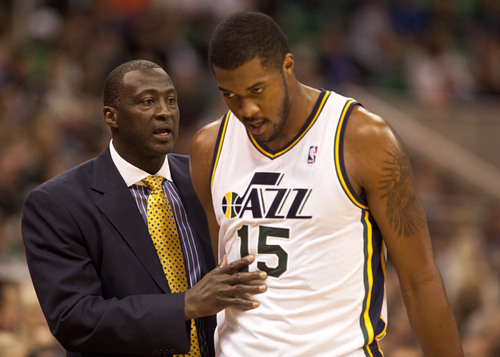This is an archived article that was published on sltrib.com in 2014, and information in the article may be outdated. It is provided only for personal research purposes and may not be reprinted.
Donald Sterling is no longer the owner of the Clippers, no longer a part of the NBA.
The league on Tuesday announced it had finalized the sale of the L.A. franchise, transferring control from the team's disgraced longtime owner to former Microsoft CEO Steve Ballmer. In doing so, the league will hope to leave behind a troubling piece of its past and return to its regular business.
And business has been good.
That was highlighted by Ballmer's $2 billion bid for the Clippers earlier this year — a historic price and one that experts say should raise values of franchises league-wide, including the Utah Jazz.
A valuation earlier this year by Forbes Magazine estimated the Jazz were worth about $525 million, but in light of recent sales of the Clippers, Sacramento Kings and the Milwaukee Bucks, some experts believe that number to be much lower than what the Jazz might be worth.
"I could see the Jazz going for somewhere between $650 million and a billion, depending on just how competitive the bidding process was," says Pat Rishe, an economic professor at Webster University and the owner of a sports consulting firm.
While the Clippers' massive sale price will have some impact around the league, experts agree the price tag was an aberration.
"If you look at it financially, it doesn't make any sense," said Andrew Zimbalist, an economics professor at Smith College, who has been involved in multiple franchise valuation cases. "There's no way it makes any sense. In my view, what he's doing is buying a toy. He's using a fraction of his assets to have some fun. The same way you or I might buy a bicycle or a new TV set, he's buying the Clippers."
But the sale of Kings for $534 million in May 2013 and the sale of the Bucks for $550 million earlier this year have helped raise the bar.
"Salt Lake City is, I think, more comparable to Milwaukee in terms of market size. I would argue it's a greater brand than Milwaukee or Sacramento because of their history, although that's weakened some in the past few years," Rishe said.
Added Zimbalist, "The Bucks have a small market and a bad arena. If they're worth $550 million, other small market teams might be worth $600 million or $650 million."
Teams' values have risen especially of late for two main reasons: the increasing size of TV deals, and collective bargaining agreements favorable to owners.
"Media revenues continue to go up for national TV contracts. Where teams currently get about $30 million a year, that will likely double in the next contract in about two years," Rishe said.
And under the new CBA, which saw the percentage of basketball-related income players receive drop from 57 percent to 50 percent, Rishe said, "You almost have to be a crash test dummy to not make money running a basketball team right now because the terms are so favorable."
It's a market cocktail that might push some owners sitting on the fence to sell.
"Any ownership that is teetering prior to the Clippers deal has to really consider it now. You would want to strike while the iron is hot and kind of build on that momentum," Rishe said.
But while Rishe and Zimbalist both see growth slowing, economists believe there will be long-term gains to be had for nearly every franchise.
"I don't anticipate they will appreciate as rapidly as the Clippers," Rishe said. "But anybody that holds onto their team for the next 20-30 years will see significant appreciation." —
NBA franchise valuations
Team Value*
1. New York 1,400
2. L.A. Lakers 1,350
3. Chicago 1,000
4. Boston 875
5. Brooklyn 780
6. Houston 775
7. Miami 770
8. Dallas 765
9. Golden State 750
10. San Antonio 660
11. Oklahoma City 590
12. Portland 587
13. L.A. Clippers 575
14. Phoenix 565
15. Orlando 560
16. Sacramento 550
17. Utah 525
18. Toronto 520
19. Cleveland 515
20. Denver 495
21. Washington 485
22. Indiana 475
23. Philadelphia 469
24. Memphis 453
25. Detroit 450
26. Minnesota 430
27. Atlanta 425
28. New Orleans 420
29. Charlotte 410
30. Milwaukee 405
*In millions. Source • http://www.forbes.com/nba-valuations



